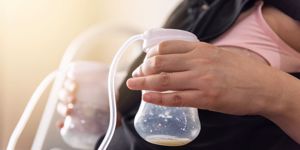So, you've survived 9 months (or more) without a proper night out and now you're ready to let your hair down and party. But you're still breastfeeding. You'll have been told by now that anything you eat and drink is then passed on to your new baby through your breastmilk, and this includes alcohol too. Research shows that even though the occasional drink won't cause any issues, a glass of vino, a couple cans of beer, or even just a vodka soda filters into your breastmilk and can disrupt your baby’s sleep patterns. The studies showed that babies that had consumed alcohol ‘tainted’ breastmilk, slept for 25% less time than those that had not. In addition, alcohol can also reduce your milk supply, disrupt your hormones, and cause your baby to take in less milk if there’s alcohol present, which means they’ll need to feed more often. It’s advised not to drink more than 14 units of alcohol, which equates to about 8 beers or 9 measured glasses of wine a week on a regular basis, to be safe.
When you “pump and dump,” you pump breast milk from your breasts and throw it away rather than saving it for baby, usually dumping it down a drain. Some women mistakenly believe they must pump and dump to help remove alcohol from their breast milk after having a drink, but this is actually a myth! Alcohol leaves your breast milk just as it leaves your bloodstream. Pumping and dumping doesn't “get rid of” the tainted milk — time does.
If you do intend to go out, you could try avoiding breastfeeding for 2 to 3 hours for every drink you have to avoid exposing your baby to any alcohol in your breastmilk. Then you can skip the first breastfeed after the party and feed your baby with your expressed milk instead. The term ‘pump and dump’ actually refers to when your breasts become uncomfortably full while you’re out from leaving so long between feeds, but because the alcohol level will be quite high in your milk, moms typically dump or tip this milk away and carry on partying.
So when should you pump and dump?
You might want to if you’ll be away from the baby during one or more feeding times, and there’s no practical way to carry your milk along. Your milk is good for 6 to 10 hours at room temperature assuming the temp is less than 80 degrees F, so this isn’t usually an issue. If you have reason to believe there is temporarily something in your milk that is harmful to your baby, like alcohol or other drugs, you may need to pump and dump at feeding times until enough time has passed for the substance to be out of your system. In most cases — like with alcohol — you aren't pumping to remove the “bad” milk. You're pumping to maintain your supply and prevent engorgement while you wait for the bad stuff to leave your body. For these unforeseen reasons, it is always good to be ahead of the game. Try to have some kind of reserve of breast milk or emergency formula for when you are unable to give your baby the milk you’ve just pumped.





